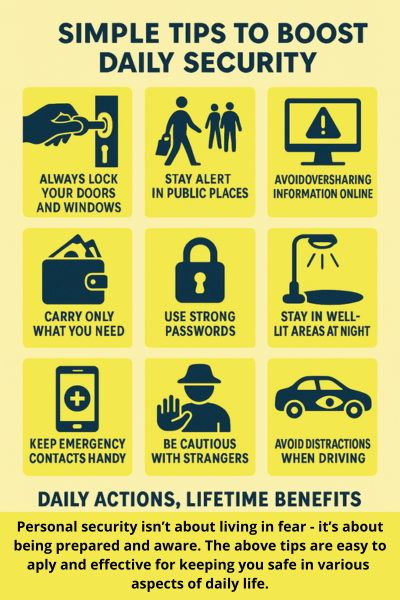Safety doesn’t always require big actions or expensive gear. In fact, small everyday habits can significantly reduce your risk in various situations—whether you’re at home, on the street, or online. Here are ten practical, easy-to-implement tips that can help make your day-to-day life safer.

1. Always Lock Your Doors and Windows
One of the simplest and most effective safety habits is locking up.
- Lock doors and windows, even when you’re at home or stepping out for a few minutes.
- Double-check before going to bed.
- Use deadbolts for added protection.
2. Stay Alert in Public Places
Being aware of your surroundings can help you spot trouble before it happens.
- Avoid walking with your face glued to your phone.
- Watch for suspicious behavior or people following you.
- Keep personal items close and zipped up.
3. Don’t Overshare Online
Social media is great, but it can also expose you to risks.
- Avoid posting your exact location in real-time.
- Don’t advertise when your house is empty.
- Be cautious about sharing travel plans, expensive purchases, or your routine.
4. Carry Only What You Need
Minimize what you take with you to reduce loss and theft.
- Carry a small amount of cash.
- Bring only essential cards and ID.
- Use a crossbody bag or keep valuables in front pockets.
5. Use Strong Passwords
Digital safety is as important as physical safety.
- Use a mix of letters, numbers, and symbols.
- Don’t reuse the same password for multiple accounts.
- Consider using a password manager for added security.
6. Stay in Well-Lit Areas at Night
Light deters crime. If you’re out after dark:
- Walk on busy, well-lit streets.
- Avoid shortcuts through alleys or isolated areas.
- Park your car in illuminated areas.
7. Keep Emergency Contacts Handy
In a crisis, quick access to help can be lifesaving.
- Save emergency numbers in your phone.
- Keep a printed list in your wallet.
- Show children or elderly family members how to reach help.
8. Be Cautious with Strangers
Not everyone has good intentions. Practice polite but firm caution.
- Don’t share personal details with people you just met.
- Be wary of unsolicited offers or help.
- Trust your gut—if something feels wrong, remove yourself from the situation.
9. Avoid Distractions While Driving
Driving requires full attention. Even a second of distraction can be dangerous.
- Put your phone on “Do Not Disturb” mode while driving.
- Don’t eat, do makeup, or multitask at the wheel.
- Follow all traffic laws and stay focused.
10. Learn Basic Self-Defense
You don’t need to be a martial artist to protect yourself.
- Take a self-defense class in your area or online.
- Learn how to break a hold, block an attack, or escape a grip.
- Carry a whistle, personal alarm, or legal self-defense item like pepper spray if needed.
Everyday Actions, Lifelong Benefits
Personal safety is not about living in fear—it’s about being prepared and aware. The tips above are simple, quick to apply, and effective in helping you stay safe wherever you are. When practiced daily, these small steps build strong habits that can make a big difference.


